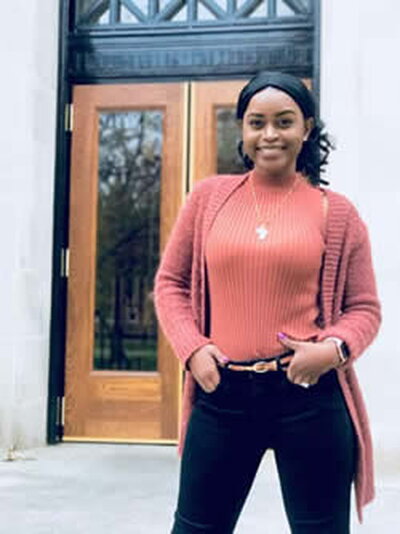
HABARI TALKS TO ZAM NALUBEGA, PRESIDENT OF AFRO LANGUAGE AND CULTURAL EXCHANGE (ALCE), DOCTORAL STUDENT IN EDUCATION & CURRENT FLAS FELLOW

Can you say a little bit about yourself and how the idea of creating the Afro Language and Cultural Exchange (ALCE) came about?
My name is Zam “Kendra” Nalubega. I am a graduate student in Curriculum and Instruction with a concentration in Language and Literacy, and minor in African Studies. I was born in Rwanda and raised in Uganda, eastern Africa. I speak four languages: Luganda, Kinyarwanda, English, and Swahili, and I am functional in Arabic. I love languages and I hope to learn a few more in the future!
The idea of creating ALCE lingered in my mind for quite some time as I was working on my bachelors’ in Linguistics. I am a FLAS fellow (studying 4th year Swahili) and throughout my experience in language courses, I realized that my peers needed extra support to succeed academically because learning a new language can be challenging no matter how hard they are working. I thought of initiating an organization that would work to help students learn and retain the language through peer tutoring, applying for language scholarships/fellowships, engaging with other cultures through extra-curricular activities, and also providing space to practice and continue improving their proficiency beyond the classroom. Last but not least, it’s easier to find tutors for non-African languages, so I thought this would be a great opportunity to initiate African languages’ support.
Why is the work you do important?
The work I do is important because it allows students to get the support that they need in order to succeed in the classroom and beyond and explore study abroad options in Africa. It also encourages and motivates them to continue with the language and allows them to build strong communication skills in the language that they are enrolled. Lastly, advanced students such as FLAS fellows have the opportunity to put their skills to use by tutoring newer language learners and also gain from the experience.
What makes this organization different or unique compared to other African student organizations on campus?
ALCE is a unique organization because it encompasses an array of opportunities and resources such as the following: academic (language) support for both domestic and international students in the Afro community or others interested, social engagements, scholarship and fellowship application workshops, networking, and also community building through volunteering, language learning, and various cultural activities. It is meant to help students succeed in their target languages, retain their native language, improve heritage speakers’ abilities, network, and open doors for other opportunities. ALCE is basically an African languages oriented organization, but it is not limited to that.
Where do you see the ALCE five years from now?
I see ALCE developing into a partnership between our university, community, other universities, and relevant African organizations domestically and internationally. ALCE will continue to assist language learners and build long lasting relationships with collaborators and others with the same agenda. It will allow less commonly taught languages to have a voice, support, and resources that will take language learning beyond the classroom experience.